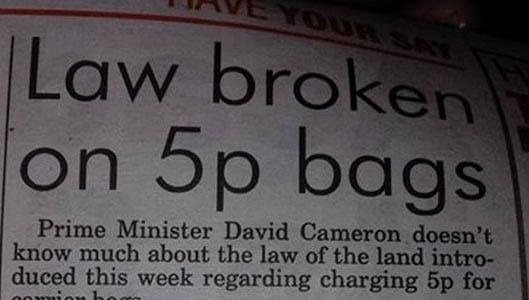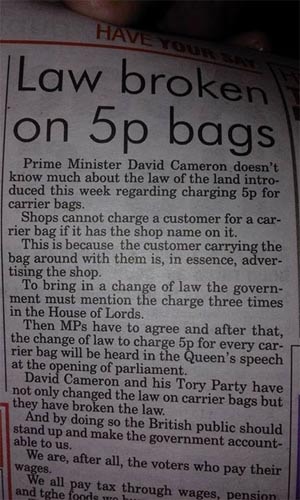Has the law been broken on 5p bags? Facebook rumours
A photo of what appears to be an article accusing the 5p charge for plastic bags in the UK of being illegal is spreading on social media. It claims that it is illegal for customers to pay for bags that advertise a specific store and the government acted illegally by changing the law.
The following photo is spreading across social media –
Prime Minister David Cameron doesn’t know much about the law of the land introduced this week regarding charging 5p for carrier bags.
Shops cannot charge a customer for a carrier bag if it has the shop name on it.
This is because the customer carrying the bag around with them is, in essence, advertising the shop.
To bring a change of law the government must mention the charge three times in the House of Lords.
Then MPs have to agree and after that, the change of law to charge 5p for every carrier bag will be heard in the Queen’s speech at the opening of Parliament.
David Cameron and his Tory party have not only changed the law on carrier bags but they have broken the law.
And by doing so the British public should stand up and make the government accountable to us.
We are, after all, the voters who pay their wages…[disappears]
The photographed article above appears to show a reader submitted piece to a yet unknown publication. The title at the top of the article reads “HAVE YOUR SAY” suggesting this has not been written by the staff of the publication.
There appears to be two assertions made by the piece. Firstly that it is illegal for customers to pay for a bag if the bag advertises the store brand since this results in the customer advertising the shop. Secondly that the government acted illegally by posing such a charge in the first place.
Sponsored Content. Continued below...
Firstly, regarding the claim that it is illegal for customers to purchase carriers bags because they have the brand logo of a store on them, this assertion appears to be entirely baseless. The article does not provide any legal citation to back-up its accusation that this would be illegal. Both Wales and Scotland have had this law enforced for 4 years and 1 year respectively, and they are also under the jurisdiction of the UK Parliament.
And of course it is worth noting that many stores – including both designer fashion stores and supermarkets like Lidl – have long been charging for carrier bags that display their branding, thus the implication that such a practice is illegal is demonstrably baseless, and given the coverage that this measure has invited over the last few months, it would seem almost certain that any potential legal repercussions would have already been thrust into the spotlight.
It is of course worth noting that customers are under no obligation to purchase 5p carrier bags and thus “advertise” for these stores. Customers are free to bring their own packaging for the products that they purchase (which is the idea behind the 5p carrier bag scheme in the first place.)
Sponsored Content. Continued below...
Secondly, regarding the claim that the government acted illegally by imposing the new law in the first place, this is also entirely false. The photographed article fleetingly describes the process in which a law is made within the UK Parliament (yes, a new law needs to go through three readings in both the House of Lords and House of Commons, and then given a Royal Assent from the Queen, though the reality is even more complex than that.) However the photographed article fails to provide any evidence that this process did not happen. From what we can determine, the 5p carrier bag law was proposed, legislated and passed in the same way as all other bills – by going through this Parliamentary process – and was indeed given Royal Assent by the Queen – you can hear her talk about plastic carrier bags and the environment here in her Parliamentary speech given in 2014 (around the 3 minute 20 seconds mark).
Part of the law making process is to turn a proposal into legislation – “Highly specialised lawyers – called parliamentary counsel – work to translate the principles outlined in the government’s proposal into detailed legislation.” – if the author of the photographed article believes they know more about UK law than these “highly specialised lawyers” then he or she will need to back up his or her claims with legal sources, as opposed to a fleeting and vague comment in a magazine.
Given the photographed article provides literally zero sources to back-up its rather outlandish claims, it should not be taken seriously.
Continued below...
Thanks for reading, we hope this article helped, but before you leave us for greener pastures, please help us out.
We're hoping to be totally ad-free by 2025 - after all, no one likes online adverts, and all they do is get in the way and slow everything down. But of course we still have fees and costs to pay, so please, please consider becoming a Facebook supporter! It costs only 0.99p (~$1.30) a month (you can stop at any time) and ensures we can still keep posting Cybersecurity themed content to help keep our communities safe and scam-free. You can subscribe here
Remember, we're active on social media - so follow us on Facebook, Bluesky, Instagram and X

